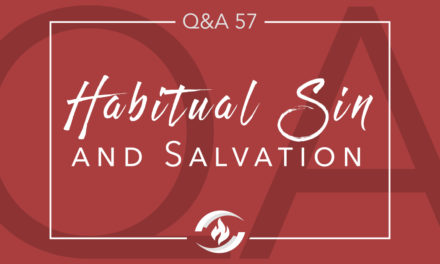Q.
Hi John, I am confused about the meaning of Romans 8:1. Just looking for some light about meaning. It seems to indicate a conditional salvation, if you walk in the spirit you will not be condemned but if you walk in the flesh you will be condemned. And other verses in Romans 8 that say if you walk in the flesh you will die? Just wondering how does this line up with assurance. It is causing me to feel doubt and fear.
Thanks.
A.
Hello,
Thank you for your inquiry. These are fair questions. Thankfully, there are clear answers.
Regarding Romans 8:1, there are several considerations. First, the context of this section of Romans is to believers. While Romans 1-5 addresses justification for sinners, Romans 6-8 addresses sanctification for saints. Romans 6:2 addresses those who have died to sin (believers) and then emphasizes some key facts of provision they need to know. Romans 7 discusses the subtle danger of law focus that leads to self-dependence and ends up in failure, but it concludes with the possibility of victory through Jesus. Then Romans 8 reveals how this victory is accessed by faith in the Holy Spirit. All of this addresses saved people.
Second, the moment one places faith in Jesus, they are placed by the Spirit into Christ. Galatians 3:26-27 says, “For ye are all the children of God by faith in Christ Jesus. For as many of you as have been baptized into Christ have put on Christ.” Once you are in Christ, you cannot ever be taken out of Christ. First Corinthians 6:17 affirms, “But he that is joined unto the Lord is one spirit.” God never cuts Himself off. So, Romans 8:1 declares, “There is therefore now no condemnation to them which in are in Christ Jesus.”
Third, precision of thought is explained in Romans 8:1, “There is therefore now no condemnation to them which are in Christ Jesus, who walk not after the flesh, but after the Spirit.” The first statement is glorious. There is therefore now no condemnation to them which are in Christ Jesus. Once you are in Christ, there is no condemnation before God, period. In fact, in some Greek manuscripts, the verse stops right at this point and proceeds to verse two. The second statement, who walk not after the flesh, but after the Spirit, speaks to experiencing the no condemnation before yourself when you walk in the Spirit. When we walk after the flesh, we may not “feel” saved even though we are. But when we walk after the Spirit, we experience our salvation in the present tense.
Regarding Romans 8:13, the context is clearly to saints. The whole verse reveals this, “For if ye live after the flesh, ye shall die: but if ye through the Spirit do mortify the deeds of the body, ye shall live.” Romans 6:2 says believers have “died to sin,” not “sins,” but that something inside of our flesh that influences us to commit sins. When we cave in to the flesh, we are yielding to indwelling sin, which is that part of us that we died to (were separated from) when we got saved. Specifically, our old man (unregenerated spirit) died to sin (Rom. 6:6) and was raised the new man (regenerated spirit), where the Holy Spirit of life now dwells. Although we died to indwelling sin, it still resides in our flesh and seeks to operate in our flesh, but it is totally separated from our new man which is in union with the Holy Spirit. So, when we yield to the flesh, we experience that which is separate from God, who is life, that is, we experience death or we might say “deathliness.” But when we yield to the Spirit, we deprive the flesh from powering up, as we experience Christ in us—life. Romans 8:13 speaks to what we experience, not whether or we are saved.
We’d love to hear your thoughts on this subject in the comments section below! If you have a question on another subject, we welcome you to make a submission by clicking here:












I am forever amazed, plus a little – but sadly – amused, how people of faith will loudly proclaim – “Once in / never out” – and then immediately start doubting themselves or raising doubts in others. Unfortunately, preachers being the biggest doubt creators. Humanity just cannot accept that something so big can be so simply given.